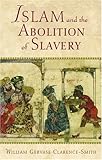Islam and the abolition of slavery / William Gervase Clarence-Smith.
Material type: TextPublisher: Oxford ; New York : Oxford University Press, 2006Description: xxvi, 293 p. : maps ; 23 cmISBN: 0195221516 (cloth : alk. paper); 9780195221510Subject(s): Slavery and Islam | Slavery -- Islamic countries -- HistoryDDC classification: 297.2/7 LOC classification: HT919 | .C53 2006Online resources: Publisher description | Contributor biographical information
TextPublisher: Oxford ; New York : Oxford University Press, 2006Description: xxvi, 293 p. : maps ; 23 cmISBN: 0195221516 (cloth : alk. paper); 9780195221510Subject(s): Slavery and Islam | Slavery -- Islamic countries -- HistoryDDC classification: 297.2/7 LOC classification: HT919 | .C53 2006Online resources: Publisher description | Contributor biographical information | Item type | Current library | Call number | Copy number | Status | Notes | Date due | Barcode |
|---|---|---|---|---|---|---|---|
 Books
Books
|
Female Library | HT919 .C53 2006 (Browse shelf (Opens below)) | 1 | Available | STACKS | 51952000117599 | |
 Books
Books
|
Main Library | HT919 .C53 2006 (Browse shelf (Opens below)) | 1 | Available | STACKS | 51952000144120 |
Browsing Female Library shelves Close shelf browser

|

|

|

|

|

|

|
||
| HT321 .C576 2016 The emergence of the urban entrepreneur : how the growth of cities and the sharing economy are driving a new breed of innovators / | HT321 .O88 2009 Urban economics / | HT384 .M47 M4313 2012 The medina : the restoration & conservation of historic Islamic cities / | HT919 .C53 2006 Islam and the abolition of slavery / | HV1454 .T693 2016 Towards human rights in residential care for older persons : international perspectives / | HV1552 .D576 2017 Disability in antiquity / | HV1568.4 .E45 2016 Restricted access : media, disability, and the politics of participation / |
Includes bibliographical references (p. 234-276) and index.
CHAPTER 1: INTRODUCTION: THE EMBARRASSING INSTITUTION -- The nature of slavery in Islam -- Rhythms of expansion and contraction -- Slave numbers -- Orientalist contradictions -- The logic of Islamic abolition -- PART I: THE CONTRADICTIONS OF SLAVERY -- CHAPTER 2: A FRAGILE SUNNI CONSENSUS -- Early uncertainties -- Taking infidels in holy war -- Slave raiding and kidnapping -- Tribute, purchase, and adoption -- 'People of the book' -- Conversion and freedom -- Punishing 'bad Muslims' -- Concubines and eunuchs -- CHAPTER 3: DISSENTING TRADITIONS -- Ascetics and mystics -- Theologians and philosophers -- Establishing a Shi'i consensus -- Isma'ili divisions -- Other sects -- Slave revolts -- CHAPTER 4: CUSTOMARY LAW -- Liberation after a fixed term or on conversion -- The ambiguities of ethnicity and race -- Slavery by birth -- Self-enslavement and the sale of relatives -- Debt bondage and serfdom -- Crime and taxes -- Female and mutilated slaves -- CHAPTER -- 5: SULTAN'S LAW -- Military slavery -- Administrative and harem slavery -- Mughal reforms -- The turning of the Ottoman tide -- Iran, Morocco, and other gunpowder states -- PART II: THE ROADS TO ABOLITION -- CHAPTER 6: IMPERIALISM AND SECULARISM -- The Maghrib between colonialism and secularism -- From reform to revolution in the Ottoman empire -- Hesitation on the Nile -- Middle Eastern stragglers -- Abolition from Inner to Southeast Asia -- Conflicting experiences in Africa -- CHAPTER -- 7: THE ULAMA AND QUASI-ABOLITION -- Dissenting reformers -- South Asian Sunni pioneers and their opponents -- Apotheosis in the Maghrib -- Wider Arab reformism -- Ottoman conservatism -- Evolution in Southeast Asia -- Mixed responses in Africa -- Muslims in Christendom -- CHAPTER 8: MYSTICS AND MILLENARIANS -- Early Sufi reformism in West Africa -- Sufi retrogression in Africa -- Varieties of African Mahdism -- Maghribi holy warriors -- Jihads from the Balkans to Yunnan -- Risings in South and Southeast Asia -- Sufi 'jihads of the tongue' -- Peaceful millenarianism -- Integrating former slaves -- CHAPTER 9: LITERALISM -- The first Wahhabi state and its wider impact -- Saudi Arabia -- The Muslim Brothers -- Mawdudi and Hamidullah in South Asia -- Other expressions of literalism -- The West and the web -- CHAPTER 10: RATIONALISM -- The South Asian shock-troops of abolition -- South Asian gradualism -- The great caution of Egypt -- The radicalisation of the Arab world -- Progress in the Turco-Iranian world -- Southeast Asian metamorphosis -- Africa and the 'second message' of the Quran -- Developments in the West -- CHAPTER 11: TIMING AND COMPARISONS -- The course of Islamic abolitionism -- Judaic approaches to slavery -- Catholicism and servitude -- Orthodox and Protestant dispositions -- From Hinduism to Confucianism -- ENVOI.
"Contemporary debates about Muslim slavery occur in a context of fierce polemics between Islam and other belief systems. While Islamic groups had an ambivalent and generally muted impact on the legal repudiation of slavery, a growing religious commitment to abolition was essential if legislation was to be enforced in the twentieth century. In this book, William Gervase Clarence-Smith provides the first general survey of the Islamic debate on slavery. Drawing on examples from the whole "abode' of Islam," from the Philipines to Senegal and from the Caucasus to South Africa, he ranges across the history of Islam, paying particular attention to the period from the late 18th century to the present. He shows that "sharia-minded" attempts to achieve closer adherence to the holy law restricted slavery, even if they did not end it. However, the sharia itself was not as clear about the legality of servitude as is usually assumed, and progressive scholars within the schools of law might even have achieved full emancipation over the long term."--BOOK JACKET.
1 2

There are no comments on this title.